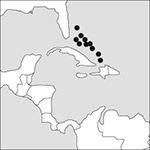
Source: MAPS IN MINUTES™ © RH Publications (1997)
Capital:
Nassau
Area:
13,939 sq km (5,382 sq miles)
Population:
319,031 (2012 est)
Currency:
1 Bahamian dollar = 100 cents
Religions:
Baptist 35.4%; Anglican 15.1%; Roman Catholic 13.5%; Pentecostal 8.1%
Ethnic Groups:
Black 85.0%; White 12.0%
Languages:
English (official); English creole; French (Haitian) creole
International Organizations:
UN; OAS; Commonwealth; CARICOM; Non-Aligned Movement
A country in the Caribbean, consisting of a group of islands in the western Atlantic Ocean, set between Florida and Hispaniola.
Physical
Of the 700 mainly coral islands some thirty are large enough to live on, the largest being the Grand Bahama and New Providence islands.
Economy
Tourism makes a large contribution to the economy, while a favourable system of taxation has led to the Bahamas becoming an important centre for offshore financial services. There is some industry and agriculture.
History
The earliest known inhabitants of the Bahamas were Arawak Indians. According to most historians, Guanahani was the site of Columbus’s first landing in the Americas in 1492. The Spanish subsequently raided the islands, attacking and enslaving the Arawaks, but did not settle there. In 1629 the Bahamas were included in the British Carolina colonies, but actual settlement did not begin until 1648, with settlers from Bermuda. By this time all the Arawaks had died out. Possession was disputed by Spain, but was acknowledged in 1670 under the Treaty of Madrid. The Bahamas became a British Crown Colony in 1717. Of major strategic importance, they were captured by the Spanish in 1782, but returned to Britain in 1783. There were also frequent raids by pirates. Many Africans were brought to the islands to work as slaves in the sugar plantations. A civil-rights movement led to the creation of the Progressive Liberal Party (PLP) in 1953. The PLP advocated parliamentary representation for the Black majority, and independence for the Bahamas. Internal self-government was achieved in 1964, the PLP was elected in 1967, and independence was gained in 1973. In 1992 the Free National Movement (FNM) won elections, ending 25 years of PLP government. The PLP was returned to power in elections in 2002, defeated by the FNM in 2007, but victorious again in 2012. The PLP government had to tackle high unemployment, rising crime, the highest rate of HIV infection outside Africa, and fluctuations in the international tourist trade, not always successfully.
- breadcrumb navigation
- breadcrumb trail
- bread-crust bomb
- breadth-first search
- break
- break-back thrust
- breakdown
- MDA
- MDMA
- MDM Observatory
- MDNS
- MD-plot
- MDR
- Meade, Carl Joseph (1950– )
- Meade Review
- Mead, George Herbert (1863–1931)
- Mealy circuit
- Mealy machine
- mean
- mean absolute deviation
- mean absolute error
- mean absolute percentage error
- mean anomaly
- mean chart
- mean current density